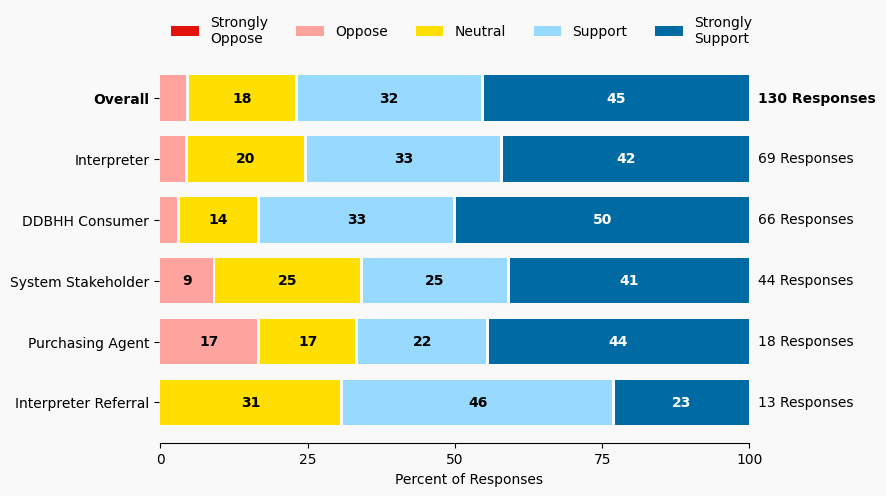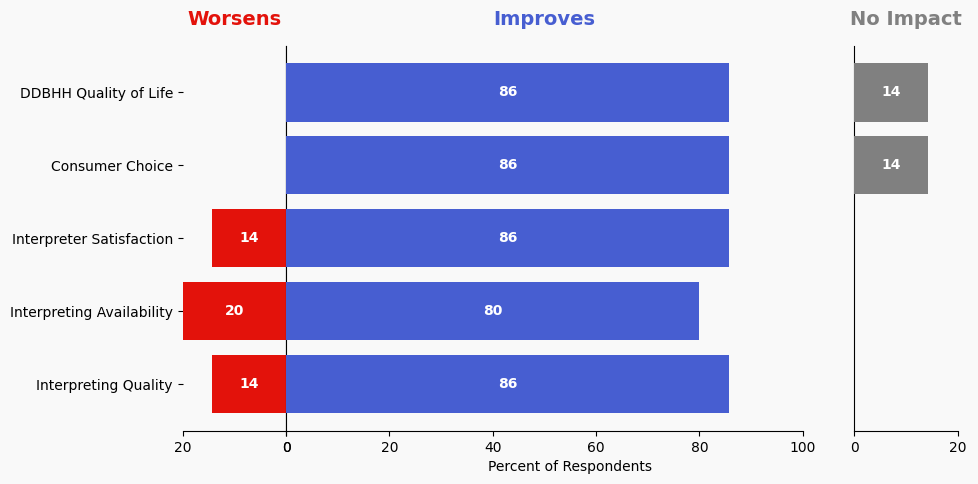29 Establish a Code of Professional Conduct for Interpreter Referral Companies
Issue: Multiple concerns have been raised about interpreter referral company practices. There is no standardization of interpreter referral companies statewide or nationwide. RID and NAD have each discussed and held groups to work on developing standards, such as a Code of Professional Conduct, Better Business Bureau ratings, or similar system for providing guidance to interpreter referral companies. No such systems or guidance currently exist.
Proposed Solution: MRID collaborate with interpreter referral companies and DDBHH community to develop a Code of Professional Conduct for interpreter referral companies. Interpreter referral companies are often critical resources that are a crux point for services. They often function as intermediaries between hearing/hiring entities, DDBHH consumers and interpreters. However, interpreter referral companies do not have formalized guidance, procedures or training. Companies are for-profit entities that strive to serve the DDBHH communities. A Code of Professional Conduct would provide a foundation upon which interpreter referral companies could base their operations.
Expected outcome: DDBHH consumers and interpreters would have a better understanding of the operations and functions of interpreter referral companies with a clearly published Code of Professional Conduct (or similar) for all interpreter referral companies operating in Minnesota.
Who is impacted: Interpreter referral companies, interpreters, consumers
Timeline: 6 months

Summary of Support Image Description
The stacked bar charts show how respondents rated their level of support and the total number of responses. The percentage for the five support levels is shown from left to right: Strongly Oppose (Dark Red), Oppose (Light Red), Neutral (Yellow), Support (Light Blue), and Strongly Support (Dark Blue).
Respondents may identify with multiple subgroups. The overall level of support is:
Overall
Strongly Oppose: 0%
Oppose: 5%
Neutral: 18%
Support: 32%
Strongly Support: 45%
Click to see the detailed image description for each subgroup.
Interpreter
Strongly Oppose: 0%
Oppose: 4%
Neutral: 20%
Support: 33%
Strongly Support: 42%
Interpreter Referral
Strongly Oppose: 0%
Oppose: 0%
Neutral: 31%
Support: 46%
Strongly Support: 23%
DDBHH Consumer
Strongly Oppose: 0%
Oppose: 3%
Neutral: 14%
Support: 33%
Strongly Support: 50%
Purchasing Agent
Strongly Oppose: 0%
Oppose: 17%
Neutral: 17%
Support: 22%
Strongly Support: 44%
System Stakeholder
Strongly Oppose: 0%
Oppose: 9%
Neutral: 25%
Support: 25%
Strongly Support: 41%
Overview of Respondents Opting for In-Depth Solution Analysis
After indicating their support level, 4% of the 130 respondents opted in to further assess whether the solution would worsen or improve on five metrics. Of the opt-in reviewers (6 respondents), 100% supported the solution, 0% were neutral on the solution, and 0% opposed the solution.
The remaining 124 respondents did not opt in to further assess the solution. Of these people, 75% support the solution, 19% were neutral on the solution, and 4% opposed the solution.
Reviewer Evaluation of Solution Effectiveness

Solution Effectiveness Image Description
The stacked bar charts show how respondents assessed the effectiveness of this solution based on five metrics. For each metric, the percentage of respondents is shown from left to right: Worsens (Red), Improves (Blue), No Impact (Gray).
DDBHH Quality of Life
Makes It Worse 0%
Makes It Better 85%
No Impact 14%
Interpreter Satisfaction
Makes It Worse 14%
Makes It Better 85%
No Impact 0%
Consumer Choice
Makes It Worse 0%
Makes It Better 85%
No Impact 14%
Interpreting Availability
Makes It Worse 20%
Makes It Better 80%
No Impact 0%
Interpreting Quality
Makes It Worse 14%
Makes It Better 85%
No Impact 0%
Reviewer Feedback and Insights
Interpreter
Comments from Interpreters suggest that a standardized code of professional conduct could help improve the quality of interpreting services. Concerns include ensuring that the code is fair and not overly punitive. Suggestions include involving both interpreters and consumers in developing the code to ensure it reflects the needs of all stakeholders.
Deaf, DeafBlind, Hard of Hearing
Comments from DDBHH Consumers express support for a professional code of conduct, with concerns about ensuring that interpreters are held accountable for their actions. Suggestions include creating a clear process for addressing violations of the code. Concerns focus on ensuring that the code promotes accountability without creating unnecessary barriers for interpreters.
System Stakeholder
Comments from System stakeholders suggest that a code of professional conduct could help improve accountability within the interpreting profession. Suggestions include involving both the Deaf and interpreting communities in developing the code. Concerns include ensuring that the code is fair and does not create undue burdens on interpreters.
PREVIOUS SOLUTION
28 Review Model, Policies and Practices of Interpreter Referral Companies
Issue: Consumers and interpreters are not always clear about how interpreter referral companies operate
NEXT SOLUTION
Issue: Greater Minnesota struggles to fill all interpreter requests.
Leave a Reply